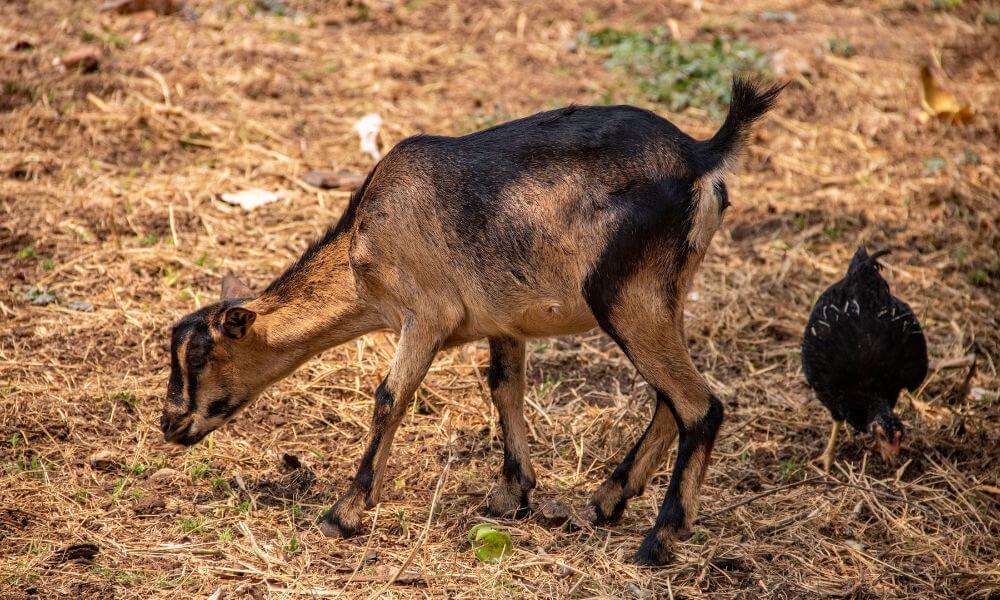Mixing goats and chickens together is becoming more and more popular, especially among homesteaders with smaller areas to work with.
Yes, they can live together, but this must be done with caution.
Keeping goats and chickens together can cause health problems, sanitary problems, and challenges separating their food.
On the other hand, keeping them together can help keep your goats stimulated.
They can even become friends!
Their relationship can be symbiotic if it is well-managed and well-researched.

Can goats and chickens live in the same shelter?
A key element to keeping goats and chickens together is that they can share the same larger space but should have separate housing (especially for feeding times).
While they can thrive with the same pasture each animal must have their own indoor area.
For the chickens, this is important so that they can huddle in a safe coop and keep warm.
Especially if you keep egg-laying hens, they need to have a warm space with perches to roost on as well as nesting boxes to lay their eggs in.
For the goats, a space of their own will allow them to have fresh, clean bedding to sleep on and a calm environment.
This is especially important for kid goats.
Goats also love to lean and scratch on the walls, so an area with solid construction and a hay rack will be ideal.
Separate spaces for each can also improve safety.
It will prevent your chickens from being accidentally trampled by the goats in a smaller space and will ensure that your goats have a cleaner space.
It also keeps water sources separated, improving health outcomes (we’ll get into that below).
Goats and chickens don’t necessarily need to be kept in entirely separate buildings, they simply need their own space.
If you have a barn with multiple stalls or areas separated by fencing then they can live there together, just with separate living quarters.
Can goats and chickens live in the same yard/pasture?
Goats and chickens will be very happy sharing the same outdoor space, whether that’s a smaller yard on a homestead or a pasture on your farm.
If you do decide to keep them in the same outdoor space, there are some things to keep in mind.
First, make sure that your fencing is appropriate for both goats and chickens.
Panels with 2X4 inch openings should do the trick.
Netting can also help keep goats and chickens in while keeping predators out.
You should also make sure that your pasture or yard is large enough to accommodate both without injuries.
In general, you don’t want to keep more than 30-40 chickens per acre or more than 6-7 goats per acre.
If kept together, then your numbers will go down.
For basic calculations you can assume each goat will replace about 15 chickens, and remember that goats should always be kept in at least a pair because they are quite social.
Next, you’ll want to make sure that their food is separated.
Keeping separate living quarters is an easy fix for this, simply keep the chicken scratch in the coop so that the goats can’t get to it.
Goats will love to eat chicken food, but it can cause lots of digestive problems and even be fatal in high amounts.
Keeping the hay in your goat’s living quarters will ensure that chickens don’t poop on it.
There are many pros to keeping them in the same pasture.
For one, foraging should mean that both goats and chickens will require less feed.
Foraging will provide both with more food, lots of exercise, and will keep them occupied all day long.
Are there health risks for goats and chickens living together?
A common challenge for goats and chickens living together is the risk of parasites.
Some parasites, like cryptosporidium, can be spread between both goats and chickens.
This parasite is most commonly spread in drinking water, soiled bedding, and contaminated feed.
It can cause major health problems for both goats and chickens, even becoming fatal in serious cases.
Salmonella is another common health risk when keeping goats and chickens together.
That is because it is present in poultry feces and can be transferred to goats, nursing babies in particular.
Baby goats may also try to eat chicken droppings, or goats might eat hay contaminated by chicken droppings, spreading infection.
The key to preventing both of these problems is separate housing.
If your goats and chickens have their own living quarters, each with its own fresh food and water source, then cross-contamination risk drops considerably.
In their outside pasture area, make sure that you do your best to manage both chicken and goat droppings.
Goats like to forage above ground level, so if they have plenty of plants, they likely won’t eat chicken droppings while outside.
Still, keeping a clean pasture will help prevent germs.
Try to make sure that chickens cannot perch above areas where goats like to forage, and make sure that all chicken food is kept away from the goats.
Goats and chickens may need to share a water source if they are kept outside and can’t easily go into their separate shelters for water during the day.
In this case, consider a covered water source with watering nipples or an automatic waterer.
Lastly, there is always a risk of injury when goats and chickens are kept together.
Making sure that they have plenty of space is the first step to preventing this.
The most common injuries are chickens getting their feet stepped on.
Make sure that chicks are kept away from goats that might accidentally trample them.
In summary, goats and chickens make wonderful pasture-mates, so long as each has their own indoor space to protect their health.
If you watch your animals carefully and make sure each has their unique needs met, then you can definitely have a safe and symbiotic farm with both goats and chickens together!
